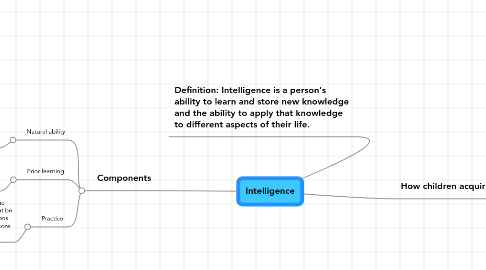
1. Definition: Intelligence is a person's ability to learn and store new knowledge and the ability to apply that knowledge to different aspects of their life.
2. Components
2.1. Natural ability
2.1.1. Children are born with a natural ability to learn. Some are quicker learners then others, this speed is part of their natural intelligence.
2.2. Prior learning
2.2.1. What children still know from prior learning experiences is also an important component. Their ability to store information for later purposes shows a higher intelligence.
2.3. Practice
2.3.1. This is a child's ability to use the knowledge learned. This might be applying it to particular situations or it might be making connections between concepts.
3. How children acquire it
3.1. Genetics (Nature)
3.1.1. Children may be born predisposed to intelligence based upon their genetics. Intelligence is partially, but not fully hereditary.
3.2. Environment (Nurture)
3.2.1. In the home
3.2.1.1. Interaction with parents and other family members can dictate the intelligence level of a child. Socioeconomic levels can effect the access to knowledge and therefore affect a child's intelligence. Culture within a home can also differ from culture of the society and effect intelligence.
3.2.2. With a caregiver
3.2.2.1. The majority of children spend their younger years in some sort of caregiver. The interactions outside of the home can effect the child's intelligence.
3.2.3. Natural experiences
3.2.3.1. Experiences in the world affect a child's intelligence as well. "Street smarts" for instance come from daily experiences and can be considered a form of intelligence.
3.3. Formal learning
3.3.1. "Children who begin their educational careers early and attend school regularly have higher IQ scores than children who do not." Formal education increases knowledge learned and helps children apply that knowledge.
